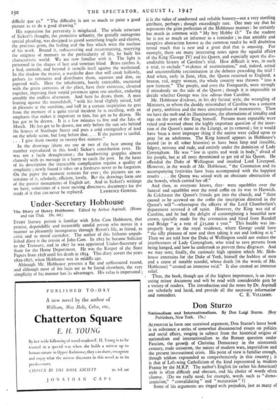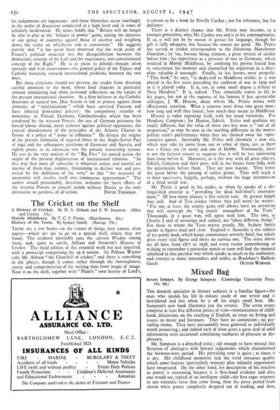Don Sturzo
Nationalism and Internationalism. By Don Luigi Sturzo. (Roy Publishers, New York. 15s.)
ALTHOUGH in form one sustained argument, Don Sturzo's latest book is in substance a series of somewhat disconnected essays on politics and social affairs, ranging in subject from the historical origins of nationalism and internationalism to the Roman question under Fascism, the growth of Christian Democracy in the nineteenth century, trade unionism, the nature of modern wars, imperialism and the present international crisis. His point of view is familiar enough, though seldom expounded so comprehensively in this country • it is that of Left-wing Catholicism of the kind represented in modern France by the M.R.P. The author's English (or rather his American) style is often difficult and obscure, and his choice of words often clumsy. (Do we really need, for example, words such as " demo- craticism," " convalidating " and " maturation " ?)
Some of his arguments are tinged with prejudice, just as many of his judgements are ingenuous: and these blemishes occur startlingly in the midst of discussion conducted at a high level and in tones of scholarly moderation. He states baldly that " Britain will no longer be able to play at the ' balance of power' game, setting the interests of one group of countries againsf those of another and weighing down the scales on whichever side is convenient." He suggests naïvely that " it has never been observed that the weak point of France's political structure was the disequilibrium between the democratic concept of the Left and the reactionary, anti-constitutional concept of the Right." He is at pains to defend—though often uneasily and with reservations—the general policy of the Papacy and Catholic hierarchy towards international problems between the two wars.
But these criticisms should not prevent the reader from devoting careful attention to the book, whose final chapters in particular contain stimulating and often profound reflections on the nature of the present international situation. As a firm believer in the Catholic doctrines of natural law, Don Sturzo is led to protest against those elements of " totalitarianism " which have survived Fascism and have infected democratic policies: the compulsory transfer of minorities in Poland, Germany, Czechoslovakia which has been condoned by the western Powers, the use of German prisoners for forced labour abroad, street violence against political opponents, the cynical abandonment of the principles of the Atlantic Charter in favour of a policy of " zones of influence." He detects the origins of the present formation of regional blocs in the Anglo-Soviet Pact of 1942 and the subsequent partitions of Germany and Austria, and rightly points to its extension into the present trusteeship system. He sees in the very anxiety of the " Big Five " for united action the origin of the present degeneration of international relations. " In this way they must all subscribe to whatever unjust and hateful act anyone of them may commit, threatening to declare war and pro- tected by the definition of the veto," so that " the necessity of unanimity will resolve itself into continuous appeasement." The author would presumably, therefore, welcome the latest efforts of the western Powers to concert action without Russia as the only
alternative to paralysis of all action. DAVID THOMSON.



































 Previous page
Previous page